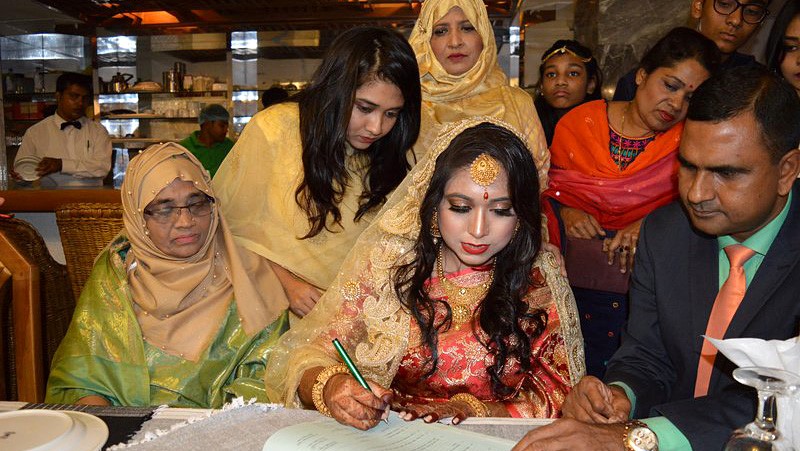To defeat diabetes in pregnancy, scale up good ideas
This summer, the Diabetic Association of Bangladesh (BADAS) received an extraordinary letter from the country’s Ministry of Law, Justice and Parliamentary Affairs. Effective immediately, all District Registers nationwide would be instructed to implement preconception counselling.
With that, a good idea for reducing diabetes in pregnancy became national policy.
Pre-conception counselling in Bangladesh began with an out-of-the-box idea. BADAS, a non-profit organisation that provides diabetes treatment through a network of more than 100 healthcare institutions, was concerned about diabetes in pregnancy. More women were developing it, at even younger ages, with devastating effects on current and future Bangladeshi generations.
To reduce these cases, they felt that better prenatal care was key – and in 2015, they approached the World Diabetes Foundation (WDF) with a project proposal. The project aimed to involve marriage registrars (Kazi in Bengali) in an effort to teach young couples about the importance of healthy, planned pregnancies.

A Bangladeshi bride signs the register on her wedding day, after receiving pre-conception counselling. Such counselling, which aims to reduce diabetes in pregnancy, is now national policy.
“89% of people in Bangladesh are Muslims, and Muslim marriage is a solemn covenant that must be registered by a Kazi,” Dr Bishwajit Bhowmik, Coordinator, Preconception Care Project, BADAS, explained. “Therefore, there is a wonderful opportunity to seek the religious influence of Kazis in creating community awareness about pre-conception care, proper pregnancy planning and the prevention of non-communicable diseases, particularly gestational diabetes.”
According to Dr Bhowmik, counselling couples before conception is critical to reducing cases of gestational diabetes.
“If a woman first approaches the health system after she is pregnant, early onset gestational diabetes or diabetes predating pregnancy might be missed.”
In addition to training 400 Kazi, the project planned to establish pre-conception care services at 50 BADAS clinics and to create a referral system between religious leaders and the clinics.
The project, Preconception care through religious leaders in Bangladesh, has not only met its goals but has begun surpassing them. For example, by the end of 2017 the project had met its training targets, and was on track to meet for numbers of couples counselled and pre-conception care services established in clinics, despite floods and landslides during the summer.
“Religious leaders in Bangladesh have a natural authority and are in continuous contact with the population,” said WDF Programme Manager Susanne Olejas. “The project has been highly successful, and attracted a lot of attention – it’s a timely response to a very relevant global agenda.”
More commitment needed
At the global level, there is a growing recognition that diabetes in pregnancy is an under-recognised, under-prioritised health issue with significant implications for women, newborns, and children throughout their lives.
Diabetes in pregnancy is treatable and preventable, but left unaddressed the disease significantly increases a woman’s risk of life-threatening complications from pregnancy. It also increases risks of stillbirth, and serious threats to newborns including death from respiratory problems and permanent disability. The ripple effects continue long after childbirth. Up to half of women with diabetes in pregnancy develop type 2 diabetes within five years. Children born to women with diabetes in pregnancy are not only more likely to develop type 2 diabetes and obesity, but they also do so earlier in their lives – creating a significant public health challenge for current and future generations.
The burden is not confined to high-resource settings or countries. According to the World Health Organization (WHO), 92% of cases of diabetes in pregnancy occur in low-and middle-income countries – those countries least equipped to withstand the burden of the disease.
As a leading funder of diabetes prevention, advocacy and care in developing countries, the World Diabetes Foundation sees the problem of diabetes in pregnancy up close, and works with partners across developing countries to address it.
Since 2002, WDF has funded 90 projects addressing diabetes in pregnancy, strengthened nearly 5,000 clinics, and screened 1 million women. There are some great ideas out there, deeply rooted in local communities and making a real impact.
Yet what we saw in Bangladesh this summer was less common – and badly needed. The government recognised the potential of BADAS’ successful pilot project and scaled it up to the national level. While the original project trained 400 Kazis, preconception counselling will now be conducted by all 6,500 Kazis nationwide increasing the likelihood of preventing diabetes in pregnancy and improve the health, rights, and wellbeing of mothers and newborns across the country.
Addressing the problem of diabetes in pregnancy will require many more actions like this. And it requires greater collaboration between the maternal health and NCD communities. That is why WDF, Women Deliver, the NCD Alliance and partners introduced the CALL TO ACTION to Prioritize Diabetes in Pregnancy to Save Lives, Improve Maternal Health, and Curb Intergenerational Transmission of NCDs.
As governments and world leaders travel to NY for the United Nations General Assembly and for the 2018 High-Level Meeting on Noncommunicable Diseases, this statement calls on governments to commit to take concerted action to address the toll of diabetes in pregnancy. Initiatives linking maternal and newborn child health with NCD prevention and care will strengthen health systems overall, and address two important targets of Sustainable Development Goal 3 – Ensure healthy lives and promote wellbeing for all at all ages.
Achieving the Sustainable Development Goals and Universal Health Coverage hinges on finding common cause and shared solutions for issues like diabetes in pregnancy. We urge you to join us in signing the Call to Action - and in encouraging more governments to find and finance solutions that address this growing global threat.


